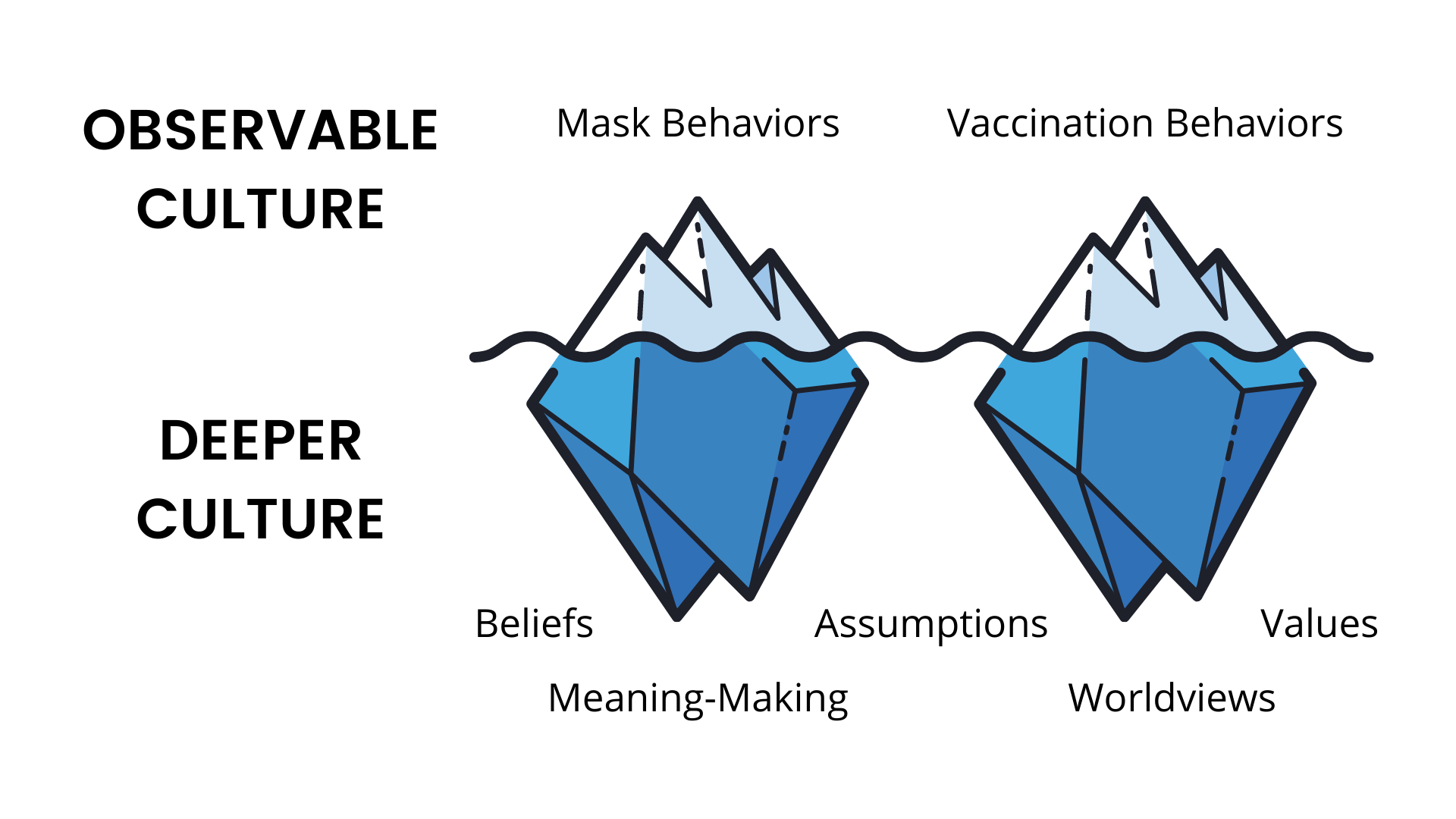COVID, Mask Mandates & Intercultural Competence
Oct 12, 2021
One topic that has come up frequently in the various programs I facilitate is how intercultural competence can help us address the difficult value conflicts we’re experiencing on our campuses and in our communities due to COVID, particularly around masking and vaccinations.
Most colleges and universities have had to make difficult decisions about whether to mandate masks and/or vaccines, and in what circumstances. What we might not realize is that intercultural competence can help us navigate complex issues such as these. In this blog post, I outline how.
Breaking Down Intercultural Competence
Let’s start by defining a few key terms.
Intercultural competence is the ability to communicate and act appropriately, effectively, and authentically across cultural difference. It’s not just relevant when engaging with people from other nationalities or ethnicities. Practicing intercultural competence can be useful any time we are engaging across difference. This brings up another important point—intercultural competence isn’t something we have or don’t have; it’s a practice.
Practicing intercultural competence requires understanding that culture runs much deeper than just the visible, observable aspects, such as traditions, food, language, institutions, etc. For this reason, culture is often compared to an iceberg. Below the water’s surface are deeper values, beliefs, assumptions, and worldviews. These have to do with how we make sense of the world, what we’ve been taught is right and wrong, respectful and disrespectful, etc. These deeper aspects influence observable culture, but are often outside our conscious awareness, and not easily changeable.
Wearing or not wearing a mask; getting vaccinated or not—these are observable behaviors. But these behaviors are motivated by much deeper-level values, assumptions, and ways of making meaning of the world. We think the issues we face are about masking or vaccination choices. But they are really about something much deeper. They are about a clash in values, mindsets, lived experience, and ways of understanding the world.
In many circumstances, we’re trying to resolve the above-the-waterline (i.e. observable culture) differences without fully understanding, appreciating, or often even recognizing the deeper-level differences. In most cases, such an approach is insufficient.
Developing intercultural competence involves developing more complex mindsets. That is, moving from seeing issues such as this in dualistic, “us vs. them,” good/bad, black/white ways, to understanding and appreciating the shades of gray, the nuance and complexity.
An “us vs. them” mindset is polarizing. It’s not an effective means for bridging differences or solving complex problems. If we approach the issues surrounding masking and vaccines as “us vs. them,” we fail to recognize and appreciate the common humanity we share with others. As a result, we’ll likely fail to come up with an adaptive solution.
Approaching these issues in an interculturally competent way would require us to first examine our own values, assumptions, and ways of making meaning around this issue. Why are we behaving as we are? What are the deep-seated beliefs or assumptions motivating our behavior? Where do these come from? How are we perceiving others? Are we feeling righteous or better-than?
We’d also need to get deeply curious about others’ perspectives, to try to understand and appreciate their experience, values, and ways of making meaning as equally rich and valid as our own, even if we disagree with them—especially if we disagree with them. How can I better understand their perspective? Do I understand what truly matters to them and why? How could I empathize? What values might we actually have in common if we dig deeper? Have I considered how they might view me and my perspective?
Once we deeply understand another’s point of view—and appreciate it as equally rich and valid as our own—we can consider how to respond in mindful and intentional ways, as opposed to just reacting based on out-of-awareness values and assumptions. We can explore how to bridge our differences in ways that are going to be effective (achieve what we are trying to achieve), appropriate (respect all parties involved), and authentic (without losing our soul).
If we are practicing intercultural competence, we’d adapt our approach so we’re not forcing others to do things our way. Instead, we’d work together to understand one another in a deeper way—our shared goals, as well as our differing values or beliefs—and figure out creative, innovative ways to bridge the differences. Even if we can’t get everyone working together toward shared goals, making the effort to better understand our own and others’ perspectives can help us see the value clashes at the heart of the issue, empathize more deeply with others, and approach finding a solution in a more empathetic, respectful way.
Implications
I hope it’s clear by now that intercultural competence entails more than simply learning about other cultures, or even acting appropriately while traveling abroad. It’s a critical mindset, heart set and skillset for the 21st century and beyond—one that’s needed locally as well as globally.
The world is becoming increasingly complex. Colleges and universities need to prepare graduates to tackle complex, divisive issues such as those we’re experiencing as a result of the COVID pandemic. Focusing on developing students’ intercultural competence does just that.
Of course, as I’ve discussed extensively elsewhere, we must start by developing our own intercultural competence as educators. Not only will it help us develop our students, but it will also help us better address the complex issues we face on our campuses today.
Photo credit: Arya Pratama, Unsplash
Join the Conversation!
Enjoying the blog? You’re invited to join me and an amazing group of higher education professionals committed to fostering intercultural learning at the next Intercultural Leadership Forum! You'll have a chance to connect with others doing this work and gain new insights as you move toward your intercultural goals.


